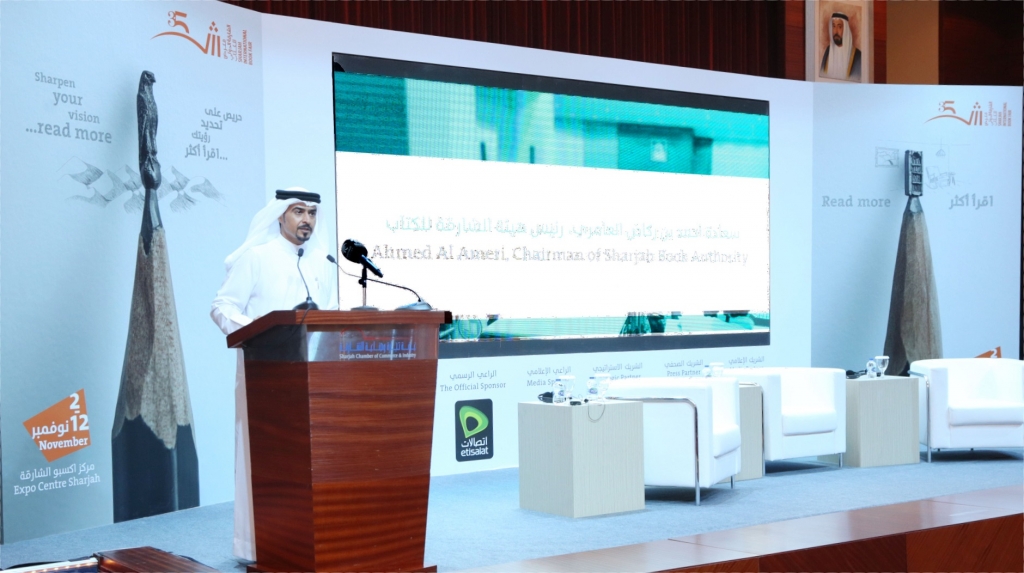
SIBF 2016 Commences the 6th Edition of Its Professional Programme
In the fast-changing global dynamic of the publishing industry, the healthy coexistence of print and electronic media, and the role international collaborations can play in advancing their outreach within the Arab regions, was the cornerstone of day one’s discussions at the sixth edition of Sharjah International Book Fair’s (SIBF) Professional Programme 2016.
In his welcoming address HE Ahmed bin Rakkad Al Ameri, Chairman of SBA said: “The cultural renaissance in the UAE has its roots in Sharjah, which was started and is being led by His Highness Sheikh Dr. Sultan bin Muhammad Al Qasimi, Member of the Supreme Council and Ruler of Sharjah.”
Al Ameri added: “Publishers are a key pillar in the process of generating and disseminating knowledge, and in that sense the Professional Programme is integral not only to Sharjah International Book Fair, but to the future of reading and education here in the UAE. We cannot ignore the challenges that are faced by the Arab publishing industry today, especially in the wake of new realities being posed by the digital revolution. We hope that this programme leads to valuable strategies and recommendations, as well as intensified collaborations with global publishers, which will continue to push the wheel of publishing forward in Sharjah, UAE and the rest of the world”.
The first session, titled ‘Google Play Books in MENA’, conducted by Alexander Bregman, Strategic Partnerships EMEA, Google, focused on how they have leveraged the existing potential in the Middle Eastern markets for a successful penetration of digital books. Google Play Books was launched in January 2016 in UAE, Saudi Arabia, Oman, Lebanon, Kuwait, Qatar, Egypt and Bahrain and has been doing increasing well since.
Taking this discussion a step ahead, Michael Tamblyn, President and CEO of Rakuten Kobo, addressed a session on ‘What Brings the Future? Building an eBook Marketplace’, detailing how they want to make the eBook market in this part of the world more robust by actualising their motto of facilitating readers to be able to carry their entire reading life on one device wherever they go.
He said: “We want digital publishing to be a revolution that happens with Arab publishers rather than something that happens to them, understanding the existing market dynamics and customising our offerings to fulfil their needs. Non-fiction, women’s fiction, romance and children’s literature have the biggest digital readership in MENA, where sales have undergone a 100 percent increase compared to 2015. Other important considerations are literacy levels, disposable income and a culture of book buying.”
The new and fast emerging trend of listening to audiobooks was highlighted in a talk given by Shadi Al Hasan, CEO and Founder of Flagship Projects. Highlighting how the Holy Quran was the first audiobook made available to the world in Arabic language in the 60’s, he shared how his company has been collaborating with the Swedish entity Storytel, the world’s first mobile streaming audiobook service, to develop and harness a new audiobook strategy for creating a strong market for the same throughout the Arab world.
A panel discussion on the ‘Overview of Arab Publishing’, chaired by Marcia Lynx-Qualey, Arab literature blogger and translator; and Tamer Said, Managing Director of Kalimat Group elucidated the need for identifying and executing more robust commissioning, marketing and distribution systems, which will then give life to the vibrant literature and culture this region can offer to the world. They stressed on the need to employ systems that will allow not just regional readers but Arabic readers across the world easier access to their literature. A unified bestseller list, regular publisher recommendations, updated and uniform statistics on the growth of print and e-publishing in the Arab world, TV ads on books and frequent book reviews in newspapers, increasing interest in Arab literature by translating more and more titles into English and other foreign languages were some of the improvements suggested by the panel.
The last panel discussed access, rights and translation in Arab publishing. The fact that the Translation Grant, SIBF and other initiatives have helped increase local and regional readership considerably were highlighted, and the need for international publishers to be more flexible on the financial aspects of a book deal or a translation rights discussion – since the Arab markets are still nascent as compared to their Western counterparts – were stressed upon in order to establish more long-lasting partnerships.
The SIBF Translation Grant was introduced and prospective grant seekers were encouraged to submit their applications. The programme also witnessed the beginning of matchmaking sessions – a valuable platform that participating publishers from around the world made use of to connect, collaborate, exchange best practices and ideas, in preparation of signing new partnership agreements.



























